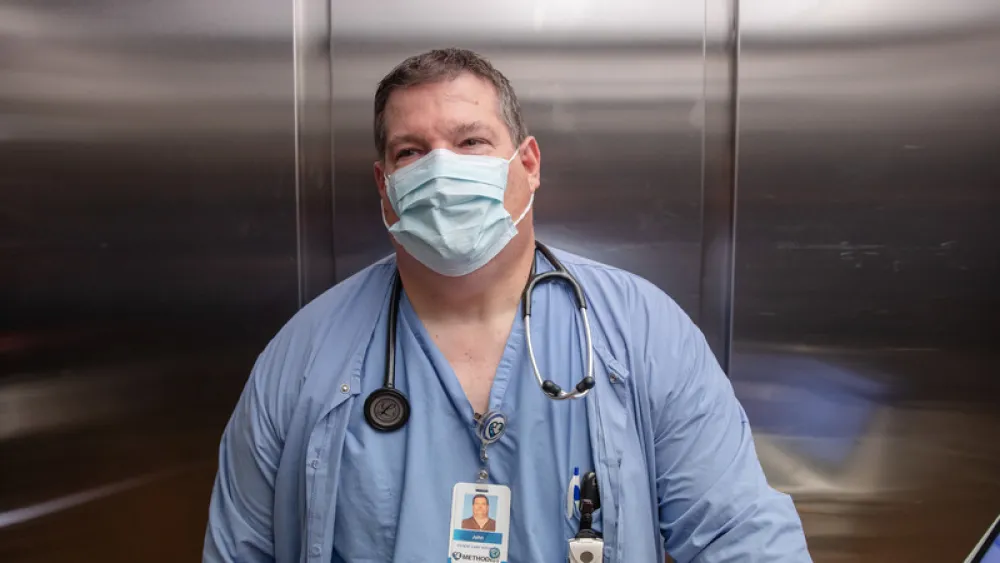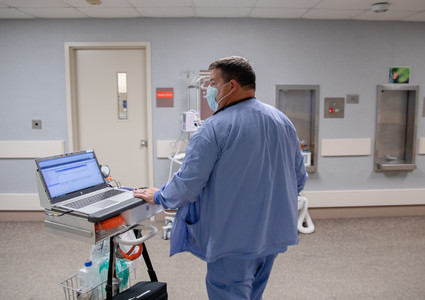Inspiring Stories
Unsung Heroes of COVID-19: Respiratory Therapists Work Side by Side with Doctors and Nurses
Published: June 1, 2020

The duties of respiratory therapists can vary so much that they’re sometimes referred to as jacks of all trades. Jarosz compares himself to MacGyver – using creative thinking on the fly to overcome challenges. But really, what respiratory therapists do is clear – they help you breathe. And during the COVID-19 pandemic, they’ve become the unsung heroes on the front lines as they work side by side with doctors and nurses.
Putting Out Fires Wherever He’s Needed
Jarosz is the day shift lead respiratory therapist at Methodist Hospital. He’s been with the health system since 1999 and is the former director of the respiratory program at Nebraska Methodist College.
As a lead therapist, Jarosz works all over the hospital and describes his job as “putting out fires” where he’s needed, when he’s needed. He performs the full scope of what respiratory therapists do. They handle airway management – providing breathing treatments for people with chronic or acute lung diseases. They manage the airway for anyone needing mechanical ventilation, and they help with intubations. They monitor ventilators and make necessary adjustments. They conduct pulmonary function tests and test blood for gas levels. They assist patients with durable medical equipment, preparing them for the use of oxygen, CPAPs or BiPAPs at home. Some assist surgeons in the operating room with bronchoscopies. Others work with cardiologists to administer nitric oxide. Now, they’ve added performing COVID-19 tests in the Emergency Department to their duties.
“We’re allowed to do what we’re trained to do,” Jarosz said. “If you can’t breathe, you need help right away. We’re at the front of the line as far as helping people get better.”
Since the COVID-19 pandemic began, his days have been filled with more meetings – being part of committees to problem-solve and respond to the crisis. That enhanced communication has been a good thing, Jarosz said. Input is happening at a “worker-bee level.”

Jarosz feels prepared as cases rise, but COVID-19 has brought challenges. Putting people on ventilators remains top of mind.
“Once we put somebody on a ventilator, the very next step is, ‘OK, what are we going to do to get them off of the ventilator?’” he said. “With COVID-19, they’re not going to come off right away. We had to come up with contingencies in case we don’t have enough machines to go around.”
COVID-19 brings physical challenges, too. Jarosz has had to prone more patients than ever before. Proning is the act of turning patients over onto their stomachs, and it’s been effective even in COVID-19 patients who aren’t on ventilators. Those patients can flip over themselves. But the ones sedated and on ventilators require six to eight people to carefully turn while keeping tubes and equipment intact. All this is done under several layers of personal protective equipment, making it hot and hard to breathe at times.
Jarosz said that once someone with COVID-19 symptoms is tested, the medical team assumes they’re positive until they find out they’re not. But you don’t always know, and that can be frustrating. But Jarosz admitted that even though it’s in the back of his mind, he isn’t scared of contracting COVID-19 at work.
“We take all the appropriate precautions,” he said. “I probably have a better chance at getting it outside of the hospital.”
"Exactly What You Signed Up For"
Jarosz is hopeful that some of the changes put in place as a result of the pandemic will become permanent.
“Some of the things we did before was because it was the way it was always done,” he said. “This has forced us to look outside the box. As horrible as this whole thing is, there’s going to be some good outcomes on the backside.”
What hasn’t changed is the way Jarosz and everyone at Methodist treat those needing care, especially those with COVID-19.
“They’re not patients. They’re people,” Jarosz said. “We’re trying to care for them and treat them, and we’re always trying to comfort them. That hasn’t changed because of COVID-19.”
The advice he gives to his own family and friends during the pandemic sounds familiar: “Wash your hands, and stay home. Don’t go someplace just because you can. Social distancing. Everything they’re telling you is what I’m telling people I know.”
As the spotlight begins to shine more on respiratory therapists, Jarosz said nothing they’re doing today is anything they haven’t done before. Yes, everything is amplified, but they’ve handled and prepared for crises in the past – SARS, Ebola, H1N1, seasonal flu – and they’re ready.
“We all knew what we signed up for when we became respiratory therapists,” he said. “It’s hard to say, ‘This isn’t what I signed up for.’ Because it’s exactly what you signed up for.”
Photos by Daniel Johnson
More Resources
- Watch Methodist’s tribute to all of its health care heroes during COVID-19.
- Read firsthand accounts from Methodist nurses on how the pandemic has changed them.
- Read more stories of Methodist staff members living The Meaning of Care.
- Follow Methodist on Facebook, Instagram and Twitter for COVID-19 updates.


